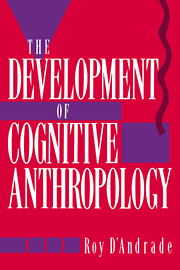Book contents
- Frontmatter
- Contents
- List of figures
- List of tables
- Preface
- 1 Background
- 2 Towards an analysis of meaning
- 3 The classic feature model
- 4 Extension of the feature model
- 5 Folk taxonomies
- 6 The growth of schema theory
- 7 Models and theories
- 8 Cultural representations and psychological processes
- 9 Cognitive processes and personality
- 10 Summing up
- References
- Name index
- General index
- Frontmatter
- Contents
- List of figures
- List of tables
- Preface
- 1 Background
- 2 Towards an analysis of meaning
- 3 The classic feature model
- 4 Extension of the feature model
- 5 Folk taxonomies
- 6 The growth of schema theory
- 7 Models and theories
- 8 Cultural representations and psychological processes
- 9 Cognitive processes and personality
- 10 Summing up
- References
- Name index
- General index
Summary
I wrote this book with two major goals in mind. At present, there is no single book to which outsiders can go to find out about cognitive anthropology. Work in cognitive anthropology has been published in articles spread across a range of journals and edited collections. One goal, then, is to bring some thirty years of work together in one place.
The second reason, related to the first, is that many social and cognitive scientists do not know about recent work in cognitive anthropology. The common view of the field was set in place by work done in the 1960s on kin terms and plant taxonomies. Research during the 1980s and 1990s on cultural models, reasoning, consensus, emotion, memory, motivation, and distributed cognition is less well known. While I have not been able to do a complete review, this book is intended to provide reasonable coverage of current research and thinking.
This book is not a standard textbook; it is too particular in its perspective and involved with current controversy. Nor is it a history of the sort historians of science write, since I have been more concerned with the presentation of ideas than with the intricacies of chronology and first authorship. However, it does try to show how the field of cognitive anthropology developed over time. I wrote it to tell what I believe is an interesting story about a fascinating problem.
Information
- Type
- Chapter
- Information
- The Development of Cognitive Anthropology , pp. xiii - xivPublisher: Cambridge University PressPrint publication year: 1995
